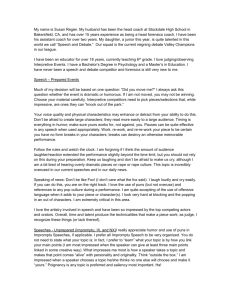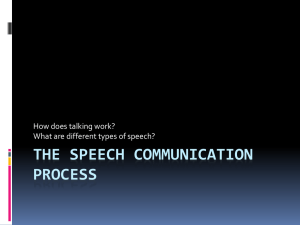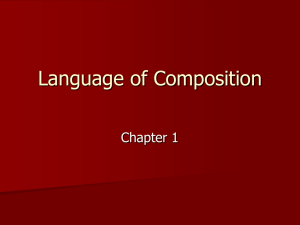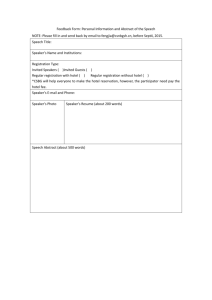IMPROMPTU GUIDE
advertisement
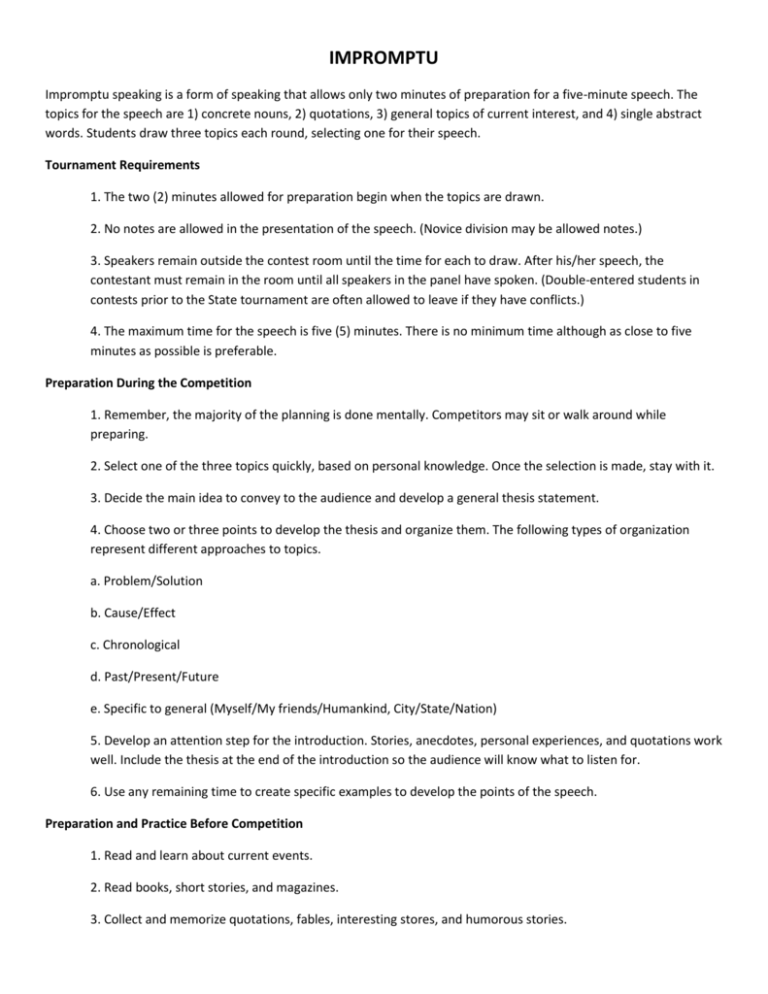
IMPROMPTU Impromptu speaking is a form of speaking that allows only two minutes of preparation for a five-minute speech. The topics for the speech are 1) concrete nouns, 2) quotations, 3) general topics of current interest, and 4) single abstract words. Students draw three topics each round, selecting one for their speech. Tournament Requirements 1. The two (2) minutes allowed for preparation begin when the topics are drawn. 2. No notes are allowed in the presentation of the speech. (Novice division may be allowed notes.) 3. Speakers remain outside the contest room until the time for each to draw. After his/her speech, the contestant must remain in the room until all speakers in the panel have spoken. (Double-entered students in contests prior to the State tournament are often allowed to leave if they have conflicts.) 4. The maximum time for the speech is five (5) minutes. There is no minimum time although as close to five minutes as possible is preferable. Preparation During the Competition 1. Remember, the majority of the planning is done mentally. Competitors may sit or walk around while preparing. 2. Select one of the three topics quickly, based on personal knowledge. Once the selection is made, stay with it. 3. Decide the main idea to convey to the audience and develop a general thesis statement. 4. Choose two or three points to develop the thesis and organize them. The following types of organization represent different approaches to topics. a. Problem/Solution b. Cause/Effect c. Chronological d. Past/Present/Future e. Specific to general (Myself/My friends/Humankind, City/State/Nation) 5. Develop an attention step for the introduction. Stories, anecdotes, personal experiences, and quotations work well. Include the thesis at the end of the introduction so the audience will know what to listen for. 6. Use any remaining time to create specific examples to develop the points of the speech. Preparation and Practice Before Competition 1. Read and learn about current events. 2. Read books, short stories, and magazines. 3. Collect and memorize quotations, fables, interesting stores, and humorous stories. 4. Organize speeches mentally based on original thesis sentences. 5. Practice, practice, practice. SAMPLE IMPROMPTU TOPICS ROUND ONE: CONCRETE NOUNS Speaker 1 1. Mirror 2. Giraffe 3. Cologne Speaker 2 1. Ladder 2. Canary 3. Pancake Speaker 3 1. Curtain 2. Elk 3. Pantry ROUND TWO: BRIEF THOUGHT-PROVOKING QUOTATIONS Speaker 1 1. The principal mark of genius is not perfection but originality, the opening of new frontiers. Arthur Koestler. 2. We never know the love of the parent until we become parents ourselves. Henry Ward Beecher. 3. A well-composed book is a magic carpet on which we are wafted to a world that we cannot enter in any other way. Caroline Gordon. Speaker 2 1. The greatest discovery of my generation is that a human being can alter his life by altering his attitude. William James. 2. Laughter translates into any language. “Graffiti” McNaught Syndicate 3. A successful marriage requires falling in love many times, always with the same person. Mignon McLaughlin Speaker 3 1. A true friend is someone who is there for you when he[d rather be somewhere else. Len Wein 2. Time marks us while we are marking time. Theodore Roethke 3. The most important thing in communication is to hear what isn’t being said. Peter F. Drucker ROUND THREE: GENERAL TOPICS OF CURRENT INTEREST Speaker 1 1. How can schools be improved? 2. Is television the vast wasteland? 3. How does racism affect American society? Speaker 2 1. Is overpopulation still a concern? 2. How should movies be rated? 3. How should U.S. cities deal with gangs? Speaker 3 1. What problems have arisen from the computer age? 2. Should dress codes be established and enforced in schools? 3. How can public transportation be improved? SEMI-FINALS: ABSTRACT WORDS Speaker 1 1. Obscurity 2. Imagination 3. Quality Speaker 2 1. Revenge 2. Loyalty 3. Redemption Speaker 3 1. Compassion 2. Solitude 3. Beauty FINALS: QUOTATIONS (See Round Two above)


